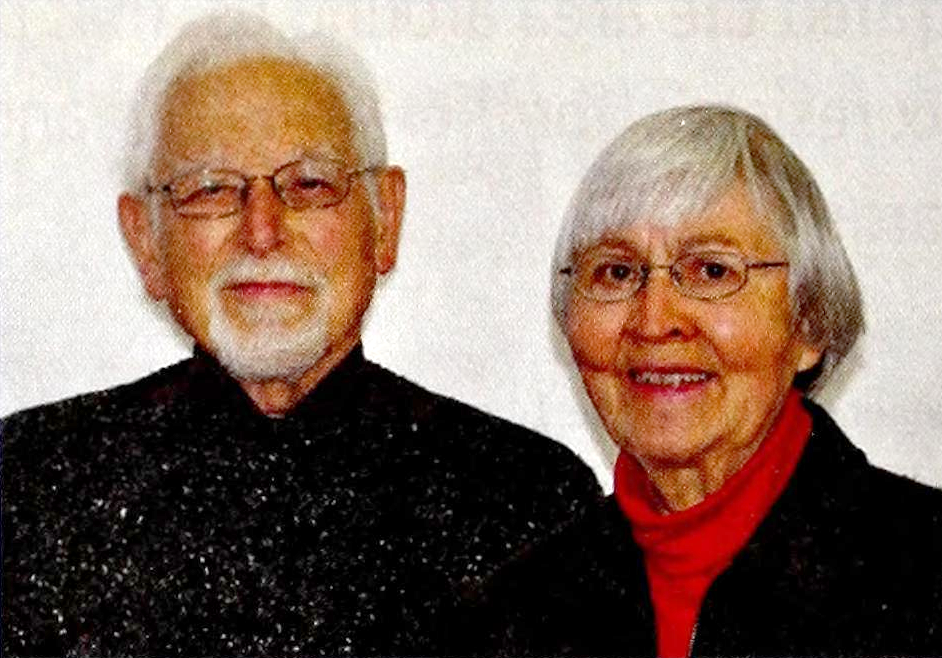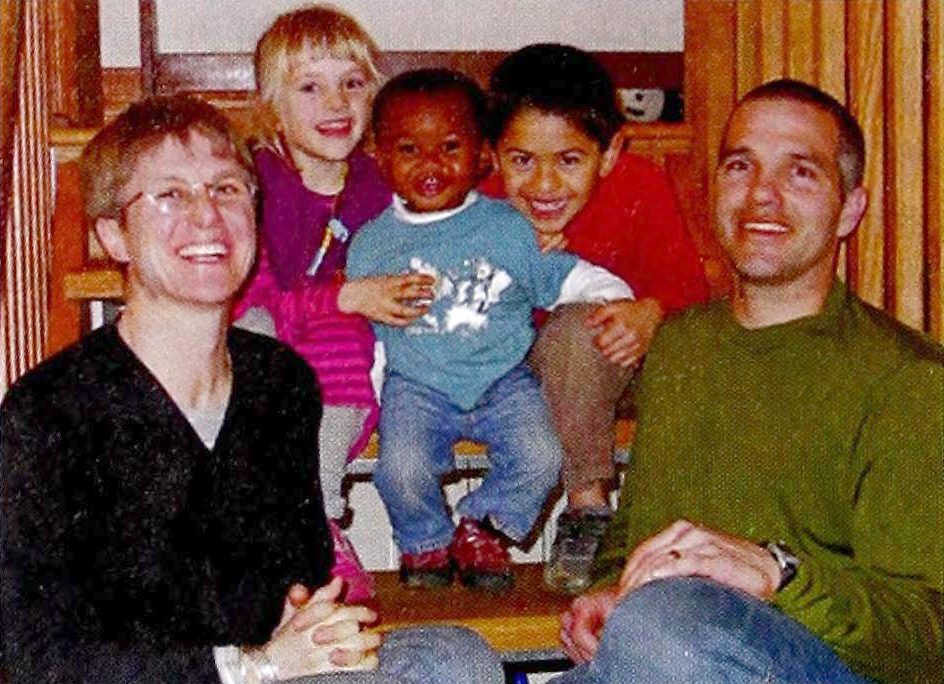This is the forty-sixth in a series of posts about war tax resistance as it was reported in back issues of The Mennonite. Today we find ourselves in our own decade.

A profile of Martha F. Graber in the edition mentioned her family’s tax resistance:
Her father [Gerhard Friesen], she said, “was ahead of his time” in advocating war tax resistance and speaking out at Mennonite conferences against profiteering from the war economy. “His conscience would not let him support the military.”
She said her father would have approved the action by the General Conference Mennonite Church to honor employee Cornelia Lehn’s request to not have her income taxes withheld from her paychecks.
The Friesens practiced war tax resistance by living simply, giving generously and usually not earning enough to owe income taxes.
Although as a youth she was embarrassed by her father’s outspokenness to audiences unreceptive to his message, Martha embraced her parents’ convictions about Christian discipleship and peacemaking and taught them to her children. She files tax returns but usually has a zero taxable income due to living simply and giving 50 percent of her income to charity. She has also advocated for the Religious Freedom Peace Tax Fund legislation.
Daniel Riehl, in a letter to the editor printed in the edition, invited readers to visit a website where they could learn how much they were contributing to war by entering their taxable income:
If one adds up the taxable income of every Mennonite in the land, how much is the Mennonite church contributing to destroying other countries for the benefit of our corporations? Is this really what we want to do with our wealth, the wealth of “Die Stille im Lande,” the capital of Anabaptists, the sweat of the brow of the meek and the nonviolent peacemakers?
In an interview with Hedwig Maria (Hedy) Sawadsky, published in the edition, she reflected on her turn to war tax resistance:
[M]y mind and heart increasingly made connections with the inherent contradiction of praying for peace and paying for war via “war taxes.” How could I, a follower of the Prince of Peace, justify paying for militarism and the building of weapons with my tax dollars? Indeed, these weapons might be used to harm or even kill my friends in the Middle East and people in other places. Increasingly my conscience was bolstered by biblical convictions.
I struggled with others who were also trying to find clarity on this issue. Later I worked in a Mennonite church in Pennsylvania where my role included teaching the Sermon on the Mount (Matthew 5–7) to ecumenical women’s groups and to young people.
Thus, while living in the state of the Quaker William Penn and delving deeper into the Scriptures as well as the Anabaptist witness, the path became clearer. For me the way to go was to live below the war-taxable level.
After considerable discernment, the church’s education committee proposed to the church leadership that I would continue in my position but would be paid as a person in Mennonite Voluntary Service so as to keep my salary under the taxable level. There was some resistance by the church leadership to my becoming a voluntary service worker. Even though there was strong verbal affirmation for our Anabaptist peace position, it was not acceptable to church leadership for me to take this stance and commit to living more simply while still holding the same position.
My resignation meant that I had six months before my two-year contract was up. I continued wrestling with the question, How can we Mennonites continue being the quiet in the land when the world is full of violence?
The edition carried a brief article about the Everence Sharing Fund, which distributed nearly a million dollars in financial assistance to thousands of needy families . It noted that the fund grew out of the Everence Federal Credit Union, from which, “[b]ecause of the organization’s unique tax status, money that would be paid in federal taxes is instead distributed through mutual aid programs like the Sharing Fund.”
Mennonite World Conference asked a question of Mennonite Church U.S.A. (the U.S. branch of the successor of the merged Mennonite Church and the Mennonite General Conference): “How are we doing as a peace church?” In the edition, André Gingerich Stoner (“director of holistic witness for Mennonite Church U.S.A.”) wrote up an answer (“after taking counsel from area conference leaders and testing [his] response with a wider circle of pastors, teachers, denominational leaders, and practitioners and others”). Here’s the part that touched on taxpaying:
For some of our congregations and members, “peace” is still primarily a matter of not going to war. In a time when there is no draft, engagement in peace witness wanes.
Our tax monies are conscripted, and each year our church members pay for cruise missiles, smart bombs, and unmanned drones — with barely the slightest tinge of conscience, let alone a whimper of protest.
The edition broke a long fast of significant war tax resistance content by profiling “fourteen individuals from one Mennonite congregation [who] are consciously redirecting their war taxes.” (Excerpts from an article compiled by Carolyn Yoder:)
April 15 is tax day in the United States. But while most people pay their taxes by that date, a group of us at Community Mennonite Church in Harrisonburg, Va., take a different route. Concerned with the high percentage of our federal tax money that goes to the military while we pray for peace, we witness to our Christian faith through how we deal with this dilemma. This often includes redirecting a portion of our military taxes to life-giving causes.
We are not against paying taxes. In fact, some of us would willingly pay higher taxes if they supported education, health, infrastructure, sustainable and clean energy sources, bike paths, or efforts to learn nonviolent ways to address complex domestic and international conflicts. That’s why we prefer a term other than “tax resistance” to describe what we do.
And we don’t think we have necessarily figured out the best way to exercise our constitutional freedom to live by our conscience when it comes to taxes. We’re ordinary people on a journey. We offer here a summary of what we do in the hope that it will encourage others who take similar actions to share their experiences in their congregations and communities. We also hope it will inspire more people to consider this type of witness.
Nathan and Elaine Zook Barge, restorative justice specialist and STAR (Strategies for Trauma Awareness and Resilience) director.
- How long have you engaged in an act witness through your taxes?
- Over 30 years
- Why do you do it?
Living and working in a Catholic and Mennonite community in Colorado Springs, Colo., in , we became aware of the dissonance between saying we were conscientious objectors to war while paying for war. Our commitment deepened during the 14 years we worked in El Salvador, Nicaragua and Guatemala with Mennonite Central Committee (MCC). Many friends or their family members had been killed or wounded by U.S. weapons, and many people suffered hunger, homelessness and illness because money was used for weapons rather than for food, health and education.
Ironically, it was on tax day, , that we experienced too closely the fear and trauma of war. Along with the Salvadorans on the bus, we prayed for safety as guns from 10 U.S. helicopters strafed the area around us. That day, we became tax resisters for life.
- How do you do it?
- It’s a journey, finding the way that works for our stage of life. Early on, we withheld 50 percent of our taxable income and redirected it to MCC. Then for many years, we lived below the taxable level, first as a couple and then as a family of four. The past number of years, we have withheld a symbolic 10 cents for every $1 billion in the U.S. military budget and redirected that money for life-giving efforts rather than war. We also reduce our taxable income through charitable donations and deductions.
David Jost, ESL Instructor
- How long have you lived under the taxable level?
- One year
- How do you do it?
- By making a small reduction in my pay-check to ensure that I owe no federal income tax.
- Why do you do it?
- Because I want to avoid financially supporting the U.S. military any way I can, and I believe that church institutions (such as Eastern Mennonite University in Harrisonburg, to which I contribute by reducing my paycheck) are better stewards of my money than the government.
Ray and Wilma Gingerich, retired peace and justice professor and retired hospice nurse
- How long have you redirected a portion of your taxes?
- Why do you do it?
- We are Mennonites (inheritors of a nonviolent way of life); we are followers of Jesus, who taught us to practice love toward our enemies. This is the explanation we give to the IRS. But our primary reason to resist the payment of military taxes is to witness to our church, to our Mennonite brothers and sisters. We are simply seeking to live lives consistent to the faith we profess. If we, the church, all those who profess Jesus as Lord of our lives, lived more like Jesus, faithfully refusing to pay for war, our country would not go to war. (That is a political fact.) How can we pray for peace while paying for war? On a more personal level, we taught our children (our own sons) not to join the military. Our two youngest sons are nonregistrants. How inconsistent then it would be for us as parents to pay others to prepare for war and to practice violence on our behalf!
- How do you do it?
- We withhold payment of the military portion of our federal income tax (approximately 47 percent) and send that amount to life-giving organizations (e.g., our local congregation’s compassion fund, Christian Peacemaker Teams and the National War Tax Resisters Coordinating Committee). A letter of explanation is sent to the director of IRS and included with our annual IRS report. Most importantly, copies of our letter to the IRS are sent to key Mennonite Church USA leaders and heads of organizations. With these letters, a handwritten note is included — an encouragement to promote the witness against the payment of military taxes.
Sue Klassen and Johann Zimmermann, public health nurse and structural engineer
- How long have you redirected a portion of your taxes?
- We have always kept our earnings low, not only for a lifestyle choice but to pay as little tax for military as possible. About eight years ago, when we came back from overseas with MCC and had taxable earnings, we started deducting taxes directly for military reasons.
- Why do you do it?
- We do it in order to inform our elected officials of our stand for peace. We send a statement to the local paper each year, and it has brought us into conversation with many different people from many walks of life about pacifist beliefs and peace initiatives.
- How do you do it?
- During the year, we underestimate our tax payments. Then when we have to pay what is due at the end of the year, we withhold a symbolic amount of 10 cents for every $1 billion that is annually spent on military funding, which adds up to approximately $80.
Jennifer and Kent Davis Sensenig, lead pastor at Community Mennonite Church and EMU adjunct professor
- How long have you redirected a portion of your taxes or minimized what you owe?
- About 15 years
- Why do you do it?
- It is a small witness for peace, a part of our life of discipleship to Jesus Christ and a way of expressing that we seek a more just, peaceable and sustainable U.S. public policy. Kent’s parents lived in Vietnam for a decade during the U.S. military intervention into that civil war and saw firsthand the destructive consequences U.S. foreign policy can have.
- How do you do it?
For some of the early years of our marriage we withheld a symbolic portion of our taxes (less than $100), which provided a reason to send letters to our Congressional representatives, the President, and the IRS, expressing our faith-based resistance to U.S. budgetary priorities vis-a-vis discretionary federal spending.
We’re not always consistent. Some years we have withheld the entire percentage of federal taxes for military expenditures, and some years we have withheld a symbolic portion. Some years we have filed under protest and written letters. For the last five years, we have managed to not owe any federal taxes (beyond Social Security) by maxing out a variety of legal tax-break options, such as charitable giving, IRA investments and mortgage-interest deductions. One of us also only has part-time paid employment, which keeps taxable income lower.
Dorothy Jean Weaver, seminary professor of New Testament
- How long have you engaged in an act of witness through your taxes?
- Thirty years or so
- How do you do it?
- I got this idea years ago from an MCC info sheet. I split my tax monies and write two checks: 55 percent to the U.S. Treasury and 45 percent to the U.S. Department of Health and Human Services. I mail both checks to the IRS along with a letter, copied to my legislators, explaining why I am doing this. I also send a symbolic sum of $45 to MCC for their “taxes for peace” fund.
- Why do you do it?
- In the letter I say that as a follower of Jesus Christ I cannot in conscience pay the portion of my federal taxes that goes to military purposes. I note that I have no intention to avoid paying the money I owe to the federal government. I simply wish to designate that these funds go to a cause that is life-giving, not death-dealing. And I submit these checks as an expression of my freedom of religion, protected by the constitution, the freedom not to have to take an action that is contradictory to my Christian beliefs.
Anna and Ben Wyse, public health nurse and owner of Wyse Cycles, with their children Martha, Desmond, and Sam.
- How long have you been living below the taxable income level?
- Since we got married, 13 years ago — with the exception of one year when we accidentally made a little too much money.
- Why do you do it?
Living below the taxable income level is at some level an act rooted in helping us sleep at night.
One component of American militarism has to do with protecting our consumptive lifestyles. The uneven distribution of wealth and uneven consumption of resources are one factor that drives conflict both in some localized conflicts and some international conflicts. As Americans, we cannot help but participate in and benefit from the violent structures that underpin our economy and society. By living under the taxable level, we at least are attempting to reckon with the dissonance we experience between what we believe and the broken world in which we all live.
We often feel like this is sort of a token act that will never really make a difference. We also know there are still numerous ways that we are complicit in the machinery of violence that our society relies on. Despite all that, this is one of the important choices we have made about how to express faithfulness and a longing for a different kind of world.
- How do you do it?
- By bringing home one income. When Anna had a job, Ben did a lot of volunteer work, and when he worked for folks he asked them to donate to various nonprofits in lieu of payment for services. Now Anna is a full-time stay-at-home parent, and we live on Ben’s income. We have to be careful with our budget, but we still live a far more abundant lifestyle than many of our neighbors in Harrisonburg and many of our global neighbors.
Rick and Carolyn Yoder, retired business and economics professor/semiretired international health systems consultant and psychotherapist
- How long have you redirected a portion of your taxes?
- Since we were married 38 years ago
- Why do you do it?
Our work has taken us to many countries where we have seen both the positive and negative effects of our tax dollars. Carolyn’s work in psychosocial trauma healing often involves dealing with the fallout of violent conflict. We believe it’s a moral issue that nearly half our taxes go to military spending and that we spend more than the next highest 15 countries combined on the military while cutting domestic spending on programs such as health care, education, and the social safety net. Redirecting a portion of our taxes to life-giving causes helps reduce the gap between our stated values on peace and nonviolence and our actions.
The research on bystanders says that silence in the face of harm or wrongdoing emboldens harmdoers, leading them to assume others support and agree with them. Doing something, even something small, puts them on alert that someone has noticed and doesn’t agree. We’re not under the illusion that our letters and voice will change things, but it does change us. And knowing what we know, how can we be silent bystanders?
- How do you do it?
- We first take steps to ensure that we owe the IRS on April 15, rather than having a refund due us. Then we redirect a symbolic amount, a couple hundred dollars, from our federal income tax payments to the National Peace Tax Fund and MCC. We enclose a letter with our tax returns, stating what we are doing and why, with copies to the U.S. President, our legislators and our congregation. We also enclose a copy of the formal action taken by Community Mennonite Church to offer its support morally, financially and otherwise to its members.
A question many people have for those of us who redirect our taxes to life-giving causes is about the consequences from the IRS. Sue and John’s experience is typical: “We receive quarterly letters from the IRS each year, informing us that we owe them money. We respond to them with a letter restating our reasons. If in a given year we have prepaid too much tax, the money that we have withheld gets subtracted from our return. We do not really mind that this happens, because we find that we have already achieved the goal of bringing attention to our stance on military spending and war.”
Rick and Carolyn have had a lien placed on their bank account for the amount owed plus interest and a small penalty. They have also had the IRS get the amount due by electronically taking their state tax refund. Ray and Wilma have been audited numerous times, likely due to the high amount of deductions they have for contributions.
H.A. Penner applauded that article in a letter, putting in a word for the “$10.40 For Peace” project along the way. In a later letter () he added:
Now, in the interest of peace, must we demand an arms embargo against all armed actors in Iraq and Syria, including the United States?
Paying for war is a form of participation in war…
But here alas, he decided to plug the Religious Freedom Peace Tax Fund instead of full-throated war tax resistance.








